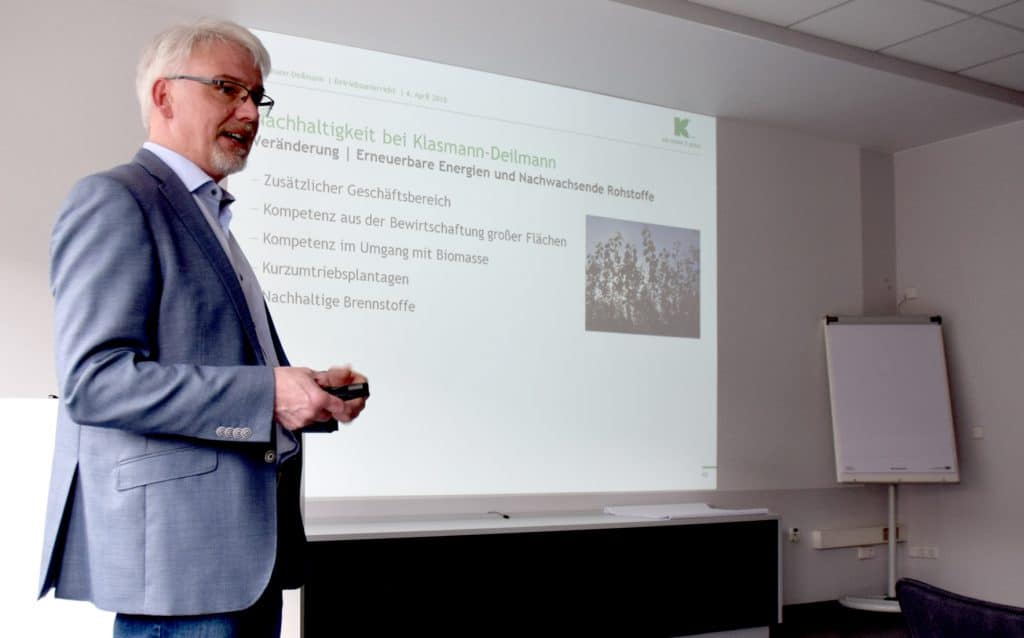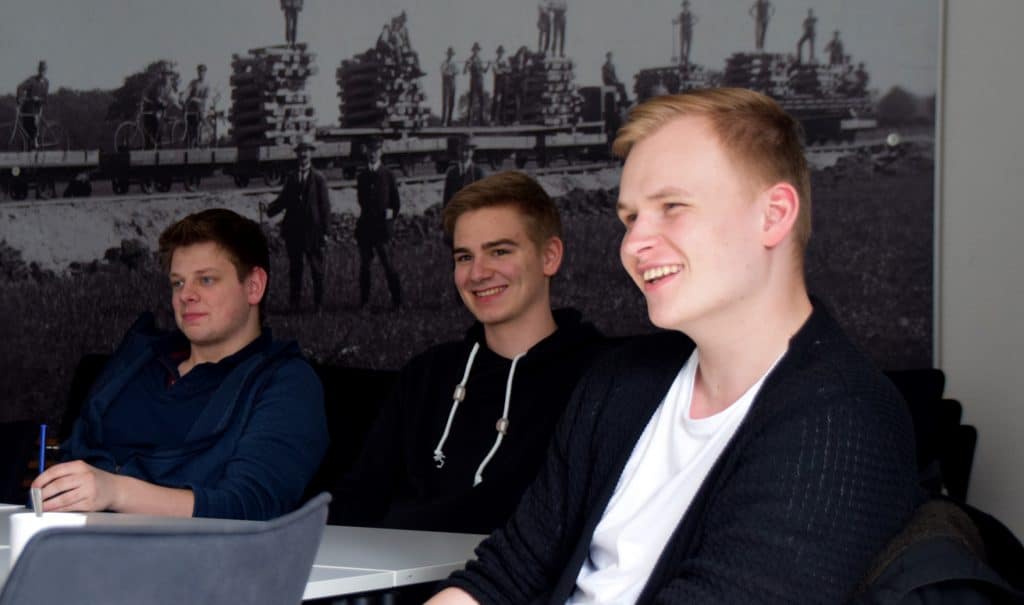Learning and teaching
In-house instruction for vocational trainees
Dual vocational training involves interplay between theory and practice. Klasmann-Deilmann’s trainees spend some of their time on day release at vocational school and the rest in the workplace. To explore subject matter in greater depth and provide insights into unknown areas, they also receive in-house teaching ‑ and these classes have been provided for more than 20 years.
In a global company, there is much to discover. So that our trainees obtain as broad an overview as possible, they spend time in several different departments. We also provide them with in-house instruction that expands on subject matter relevant to their training, give a comprehensive introduction to our company and its products, and look at topics that can be dealt with only briefly in day-to-day training.
The topic being addressed today is sustainability. During lessons, the trainees and their instructor will be exploring the three pillars of sustainability: ecology, economy and social development. With reference to the Sustainability Report, Dirk Röse (Head of Corporate Communications) will illustrate what these communications activities are all about. “So that it isn’t just empty words, we need actions, facts and valid arguments ‑ these are crucial requirements,” he says. “To create transparency regarding our climate responsibility, we calculate a carbon footprint every year. To make sustainability quantifiable, we have introduced key performance indicators. Standards make for comparability. And that’s why we produce our Sustainability Report to GRI standards.”
The trainees are impressed at the rigour with which Klasmann-Deilmann puts sustainable criteria into practice. “It’s interesting to find out what goes into a Sustainability Report,” comments Niklas Berger, who is on a combined vocational-training und degree programme in Business Administration (Betriebswirtschaft). René Föcke (Trainee Industrial Business Administrator (Industriekaufmann)) agrees, noting: “We want to grow while reducing our emissions. At first glance, that seems a contradiction in terms. I’m keen to see what solutions Klasmann-Deilmann will find to this problem.”
Some material covered is familiar to trainees from their day-to-day work, but there is always much unchartered territory. “The fact that peat extraction was once actually desired by the state before a shift occurred in public perception ‑ well, that was new to me,” says Markus Peters (Trainee Industrial Business Administrator).
Often, these in-house sessions breathe life into otherwise somewhat dry theory. “Sustainability is very much a buzzword at the moment,” says Julia Roling (Trainee Industrial Business Administrator), “but finding out how an organisation actually puts it into practice is really fascinating.” Wiebke Volkmann (Business Administrator for Marketing Communications (Kauffrau für Marketingkommunikation)) also feels that there is interplay between practice and theory. “Day-to-day work has always touched on issues of sustainability at certain points. And now we can see everything in a broader context and gain an overall picture.”
“The in-house teaching shows us where things slot into the overall framework,” says Lorena Ahrens (Trainee Industrial Business Administrator). It gives trainees a mental map showing them where details fit into the big picture: “Even if you’ve already been in a given department, often the work you do relates to only part of its remit. The in-house sessions remind you of how it all fits together and gives you a better idea of how the departments and other parts of the company are related.”
In-house instruction has been provided by Klasmann-Deilmann for more than 20 years now. “Right now, these classes have two main aims. Firstly, to take a more in-depth look at subject matter relevant to training, drawn from the various specialist divisions such as payroll, materials management and production management. And secondly, to teach trainees more about our company; about products, processes and divisions that their training doesn’t touch on so much,” says Training Manager Andrea Bruns (Human Resources Services).
Input is valued from the trainees themselves on what they want to see covered. “They know best what questions they want answered and what information they need, and are encouraged to help actively contribute to these classes,” Bruns explains. “This may take the form of classroom participation and direct questions during lessons. But we’re also open to suggestions for topics beforehand.”
In-house teaching is provided at a single location, jointly attended by our Geese-based trainees and those at our Sedelsberg site. As well as regular classes, it also includes other educational events. These include tours of the production company (Produktionsgesellschaft Nord) in Sedelsberg and a visit to the IPM trade show in Essen, Germany.

